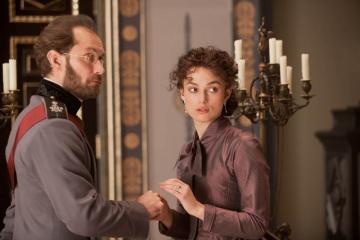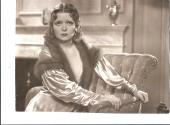The latest 'Anna Karenina' bizarre yet beautiful
"All happy families are alike; every unhappy family is unhappy in its own way."
It's the opening, and most quoted, line of "Anna Karenina." Families don't get much unhappier or more nervous, in general, than the Karenins.
Me, I get nervous when filmmakers announce the "reimagining" of a classic. (I can't help thinking of Woody Allen's "Mourning Becomes Electra on Ice!") But that's what director Joe Wright and dramatist Tom Stoppard audaciously set out to do here, for better or worse -- and it's for both.
The novel, published in serial installments between 1873-77 just before Tolstoy's big religious conversion, ranks perhaps second only to "Romeo and Juliet" as the greatest love tragedy in world literature. It tells the adulterous tale of aristocratic Anna Arkadyevna Karenina (Keira Knightley) -- dutiful if not wholly devoted wife of dull Count Alexei Karenin (Jude Law) -- and her ill-fated affair with the dashing cavalry officer Vronsky (Aaron Taylor-Johnson).
In thinking outside the literary box, Mr. Wright and Mr. Stoppard locate Anna (and us) inside a theatrical one: The action takes place in a once-glorious, now derelict imperial Russian theater -- onstage, backstage, in the wings and even the fly space of it: At the outset, Anna arrives from Petersburg in the midst of a family crisis: Her brother Stiva (Matthew Macfadyen), rampantly unfaithful to his wife, Dolly, has been caught in the act on the eve of Dolly's sister Kitty's debutante ball. Kitty loves the roguish Vronsky, who toys with her -- until seeing and instantly falling in love with Anna at the ball.
Against her will, Anna falls likewise. Karenin becomes wholly repulsive to her (what she dislikes most about him, Tolstoy tells us, is his ears). Karenin's sole concern is for propriety and his public image. Anna gets pregnant by Vronsky, who is willing to marry her. But she's the captive of social pressures, her own insecurities, Karenin's indecision about a divorce -- and, most of all, his threat to take away her son, Seryozha.
There are at least 16 feature films and five TV miniseries of "Anna Karenina," six in the 1910s alone -- during film's infancy -- through the 1961 Claire Bloom and 1985 Jacqueline Bisset (with Christopher Reeve!) television versions. Alexander Korda's 1948 film with Vivien Leigh was memorable, but the two most important belonged to Greta Garbo: In the silent "Love" (1927), she starred opposite her real-life lover John Gilbert, and their on-screen sexual chemistry was real. (The generic title was chosen so that the marquee could read, "Garbo and Gilbert in 'Love'!" and, on Irving Thalberg's orders, two endings were shot: MGM democratically gave exhibitors their choice between the tragic one and a happy one in which Anna plunges not to her death but back into Vronsky's arms.) The 1935 sound remake -- with Garbo and Fredric March -- is better.
But Keira Knightley's glorious, blazing eyes -- and curled lip, when faced with a slight -- make this one worth seeing. Not to mention the close-up tongue action of the love scenes. Pushkin-like Mr. Taylor-Johnson is androgynously, dangerously seductive. Jude Law's stiff, arrogant but oh-so-decent Karenin is admirable. And the parallel love story -- between Kitty and Stiva's old agrarian friend Levin (lovely Alicia Vikander and Domhnall Gleeson) is not short shrifted, as in most previous versions.
Mr. Wright and Mr. Stoppard share a demonstrable love of theatricality: "Pride & Prejudice" (2005) with Ms. Knightley and Mr. Macfadyen, "Atonement" (2007) with Ms. Knightley and James McAvoy, and "The Soloist" (2009) with Robert Downey Jr. and Jamie Foxx are fine stylistic examples, on the director's part. "Brazil" and "Shakespeare in Love" are equally so, on the screenwriter's part. Here, the result is reminiscent of Ken Russell's kaleidoscopic-cum-psychedelic "Tommy": like an extravagant snow globe -- maybe too extravagant for the film's own good, but nevertheless gorgeous thanks to Seamus McGarvey's stunning, sensual cinematography. (There's even a John-and-Yoko nude pose on a bed.) Mr. Wright's self-conscious, stylized dollhouse contrivances contain an erotic charge, with balletic choreography.
Tolstoy depicted Anna's ruminations and free associations in a groundbreaking stream-of-consciousness way that inspired James Joyce, Virginia Woolf, William Faulkner -- plus countless others -- and used contemporary events to add credibility and perspective to his narrative. His characters debated all the big issues of their day, from lust and love, to women's rights, to the existence of God.
"Anna Karenina" films are measured by several crucial set pieces: the steeplechase race (Anna distraught at Vronsky's danger) -- in the film at hand, 17 horses gallop across the stage, while the society patrons watch from their dress circle in a Slavic "Ascot Gavotte." It's terrific. Anna's forbidden birthday visit to son Seryozha -- who has been told she's dead -- is not so great here.
All these codes of honor and all this doomed, damned love. "I'd call on her if she'd only broken the law, but she broke the rules!" says one of Anna's hypocritical friends. "I'd rather end up wishing I hadn't than wishing I had -- wouldn't you?" says another.
It's a tough question. By the end of this bizarre, beautiful "Anna Karenina," you're still not sure -- but it's enough to make you, me and Anna throw ourselves under that suicidal train of thought.






